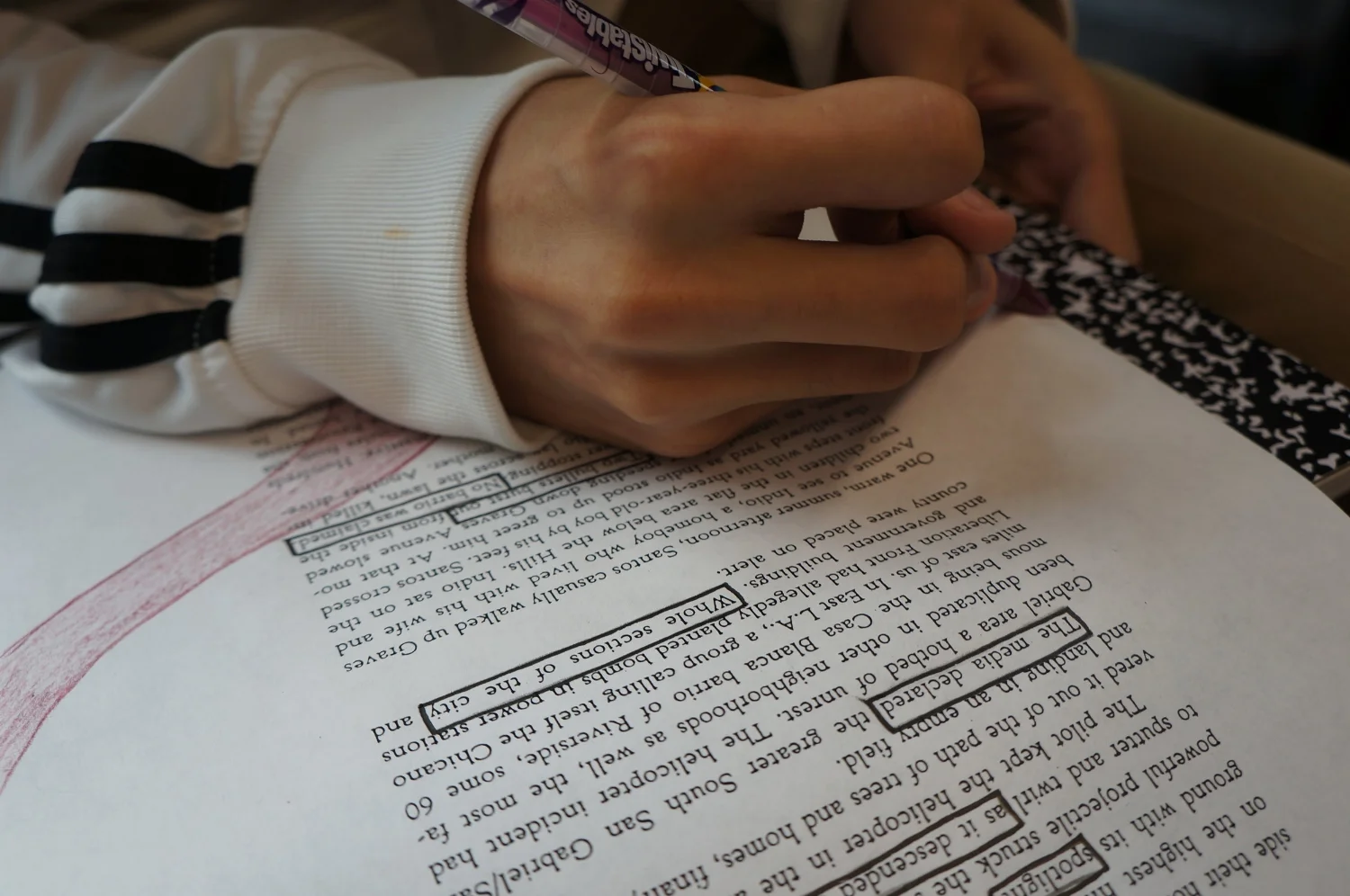By Jennifer Van Pelt
An image of one of our Adolescent Book Group students working on a blackout poetry exercise, which requires them to select certain words and phrases from a page of text to construct a poem.
October 16th is National Dictionary Day, which celebrates the English language on the day that Noah Webster was born. Webster is known for his publication An American Dictionary of the English Language, which included 70,000 words and involved learning 27 languages in order to determine the etymology of the words. This publication from Noah Webster is a predecessor to the now widely recognized Merriam-Webster dictionary that has helped millions of people understand new words.
Learning new vocabulary is an integral part of a child’s development and continues to be important into our adult lives. In an article on TalkingKids.org, it’s estimated that 3 year old children typically have between 500-1,100 words in their vocabulary. These are words that they can both verbalize and understand. A few years later, between the ages of 5-7, children typically have the knowledge to use between 3,000 to 5,000 words in their conversations. At this point in their life, their brains are “sponges”, absorbing their surrounding environment at a rapid rate.
An article on Scholastic.com outlines three reasons why vocabulary is such a large focus for children. First and foremost, vocabulary itself makes up communication -- how we speak, read, listen, and write. Secondly, the goal of reading is to understand and grow from the material. Understanding and overall comprehension of the text improves when we know the vocabulary included in it. Lastly, when children and adolescents improve their vocabulary, their academic and social confidence and competence improves as well, allowing them to succeed in diverse environments.
Reading is one of the best ways to gain exposure to words that may not be in used often everyday conversation but have significant meaning and can be added to your “word bank” for future use. On the U.S Department of Education website, a presentation about vocabulary development outlines the correlation between time spent reading and the number of words we are exposed to each year. With less than one minute of reading each day, we are exposed to 8,000 words per year. With 4.6 minutes of reading each day, we are exposed to 282,000 words per year. And with 20 minutes of reading each day (the recommended amount for beginning readers), we are exposed to 1,800,000 words per year! Learning and comprehending new words by using context clues or looking them up in the dictionary is an important step in becoming a more advanced reader.
An image of four dice spelling out the word “risk.” The word “hazard” originated from an Arabic word for a dice game that involved high risk!
National Dictionary Day also celebrates the etymology of words: where they originated from and how they came to be a part of the English language. Oxford Royale Academy lists some common words with some very interesting backgrounds. Take “hazard” for example: a word dating back to 13th-century Arabic of which “al-zahr” referred to dice used in gambling games, which had a high amount of risk involved for participants. “Al-zahr” subsequently became associated with danger and was believed to be brought to Britain when the Crusaders learned these dice games while in the Holy Land.
Looking for a fun way to celebrate this day? Try looking up etymologies of new words you learn -- or everyday ones such as sandwich or genuine! To celebrate dictionary day year round, there are multiple “word-a-day” apps and emails you can receive, including Merriam-Webster and Oxford English.
Sources:
https://nationaldaycalendar.com/national-dictionary-day-october-16/
https://www.scholastic.com/teachers/articles/teaching-content/understanding-vocabulary/
http://www.talkingkids.org/2011/07/how-many-words-should-my-child-be.html
https://www2.ed.gov/programs/readingfirst/2008conferences/language.pdf
https://www.oxford-royale.co.uk/articles/14-fascinating-word-origins-english-language.html


